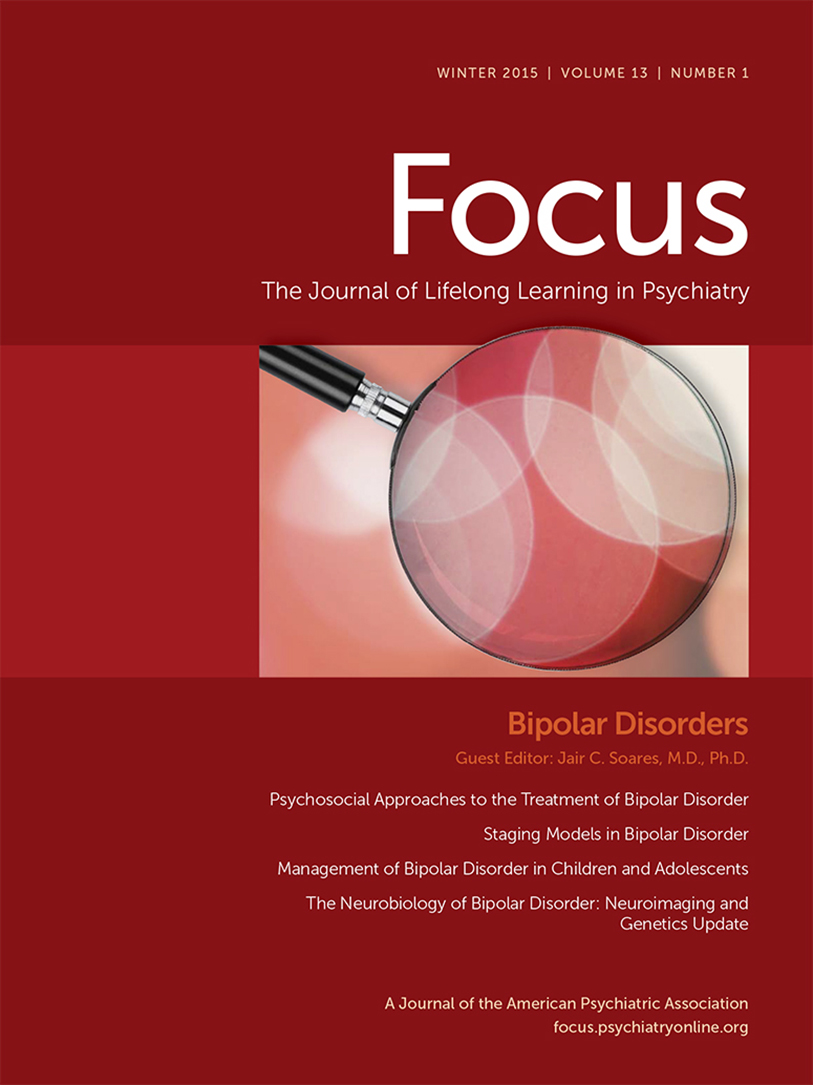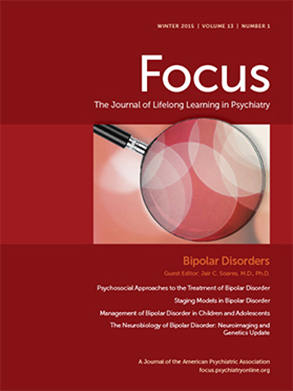Staging Models in Bipolar Disorder
Abstract
Introduction
| Stage | Berk et al., 2007 (73) | Kapczinski et al., 2009 (74) | Post et al., 2010 (75) | Duffy et al., 2010 (76) | Reinares et al., 2013 (61) | Cosci and Fava. 2013 (77) |
|---|---|---|---|---|---|---|
| 0 | At risk, asymptomatic period where a range of risk factors converge | Latent phase: mood and anxiety symptoms and increased risk for subthreshold BD | Well | |||
| 1a | Mild or nonspecific symptoms | Well-established periods of euthymia and absence of overt psychiatric morbidity or impairment in between episodes | Vulnerability | Nonmood psychiatric disorders (ADHD, anxiety and/or sleep disorders) during childhood | Low subsyndromal depressive symptoms, increased inhibitory control, and estimated verbal intelligence associated with good outcome | Mild or nonspecific symptoms/prodromal phase |
| 1b | Wide variety of prodromal patterns | Well intervals | Cyclothymia | |||
| 2 | First episode of either polarity, usually depressive | Rapid cycling and DSM–IV Axis I and III comorbidities along with transient impairment in functioning | Minor mood disorders during childhood and/or adolescence | Acute manifestations of major depression or mania/hypomania | ||
| 3a | First recurrence with subthreshold symptoms | Clinically relevant pattern of cognitive and functional deterioration | Prodrome | Major depressive episodes during adolescence | Residual depressive symptoms with increased episode density, low inhibitory control, and estimated verbal intelligence associated with poor outcome | Residual symptoms with cognitive and functional impairment despite treatment |
| 3b | Recurrences with threshold illness | |||||
| 3c | A subsequent pattern of remission and recurrences | |||||
| 4 | Unremitting or treatment refractory course of BD | Significant cognitive and functional impairment and unable to live autonomously | Illness onset | First episode of mania during late adolescence or early adulthood with or without associated substance abuse | Acute episodes despite treatment | |
| 5 | Episode recurrence | |||||
| 6 | Illness progression | |||||
| 7 | Treatment refractoriness | |||||
| 8 | End-stage BD |
Illness Progression and Staging
Neuroprogression
Functional Outcomes
Concluding Remarks
References
Information & Authors
Information
Published In
History
Authors
Funding Information
Metrics & Citations
Metrics
Citations
Export Citations
If you have the appropriate software installed, you can download article citation data to the citation manager of your choice. Simply select your manager software from the list below and click Download.
For more information or tips please see 'Downloading to a citation manager' in the Help menu.
View Options
View options
PDF/EPUB
View PDF/EPUBGet Access
Login options
Already a subscriber? Access your subscription through your login credentials or your institution for full access to this article.
Personal login Institutional Login Open Athens loginNot a subscriber?
PsychiatryOnline subscription options offer access to the DSM-5-TR® library, books, journals, CME, and patient resources. This all-in-one virtual library provides psychiatrists and mental health professionals with key resources for diagnosis, treatment, research, and professional development.
Need more help? PsychiatryOnline Customer Service may be reached by emailing [email protected] or by calling 800-368-5777 (in the U.S.) or 703-907-7322 (outside the U.S.).

